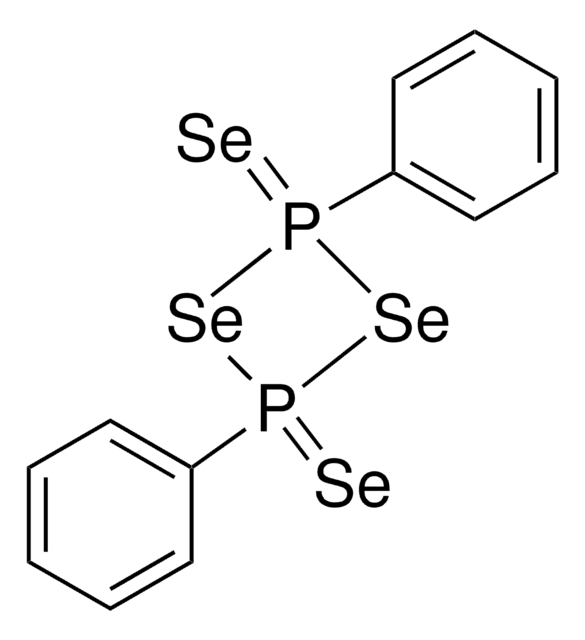227439
Lawesson reagent
97%
Synonym(s):
2,4-Bis(4-methoxyphenyl)-2,4-dithioxo-1,3,2,4-dithiadiphosphetane, 2,4-Bis-(4-methoxyphenyl)-1,3-dithia-2,4-diphosphetane 2,4-disulfide, 4-Methoxyphenylthiophosphoric cyclic di(thioanhydride), LR
About This Item
Recommended Products
Quality Level
Assay
97%
form
powder
mp
228-230 °C (lit.)
SMILES string
COc1ccc(cc1)P2(=S)SP(=S)(S2)c3ccc(OC)cc3
InChI
1S/C14H14O2P2S4/c1-15-11-3-7-13(8-4-11)17(19)21-18(20,22-17)14-9-5-12(16-2)6-10-14/h3-10H,1-2H3
InChI key
CFHGBZLNZZVTAY-UHFFFAOYSA-N
Looking for similar products? Visit Product Comparison Guide
Related Categories
General description
Application
- Oxthiaphosphinine-3-sulfide derivatives by the reaction with Mannich bases of β-naphthol and 8-hydroxyquinoline.
- 1,3,5,2-Trithiaphosphinane-2-sulfide derivatives by reacting with benzaldehyde in the presence of trialkyl phosphite.
- 2,4,6-Triphenyl-1,3,5-trithiane from benzaldehyde and ethyl acrylate.
- 9-Benzanthronethione by thionation of 9-benzanthone oxime.
- 1,2,4-Trithiolane from 2,2,4,4-tetramethyl-3-thioxocyclobutanone S-oxide.
- Sulfur derivatives of triterpenic oxo compounds.
- Tropothione in situ at room temperature and to trap it with dieneophiles.
Signal Word
Danger
Hazard Statements
Precautionary Statements
Hazard Classifications
Water-react 2
Supplementary Hazards
Storage Class Code
4.3 - Hazardous materials which set free flammable gases upon contact with water
WGK
WGK 3
Flash Point(F)
Not applicable
Flash Point(C)
Not applicable
Certificates of Analysis (COA)
Search for Certificates of Analysis (COA) by entering the products Lot/Batch Number. Lot and Batch Numbers can be found on a product’s label following the words ‘Lot’ or ‘Batch’.
Already Own This Product?
Find documentation for the products that you have recently purchased in the Document Library.
Our team of scientists has experience in all areas of research including Life Science, Material Science, Chemical Synthesis, Chromatography, Analytical and many others.
Contact Technical Service









